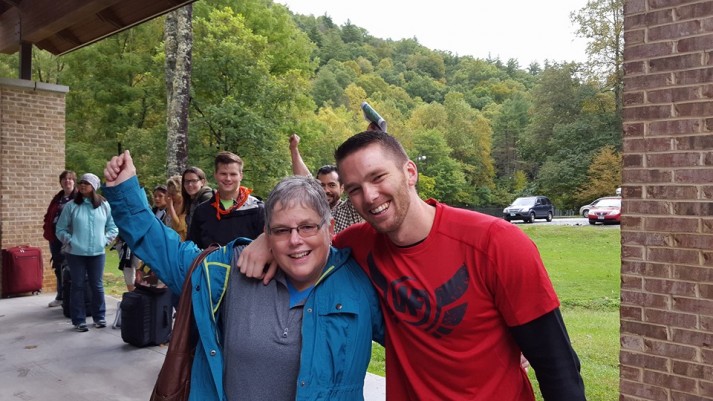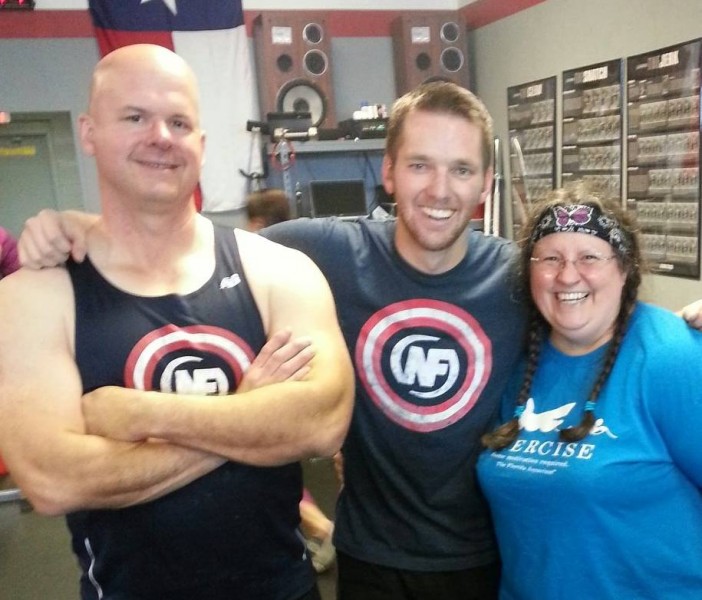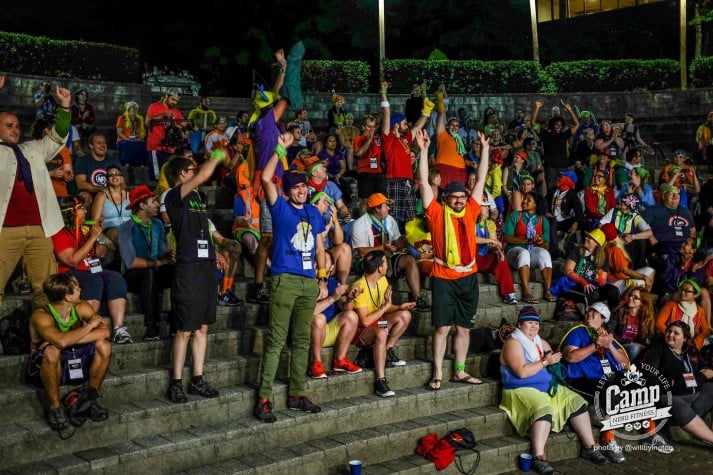Originally posted at: http://www.nerdfitness.com/

I bet I’m the oldest member of your community!”
“Am I too old for this? I don’t get all the references.”
We get these sorts of emails a few times a week.
If you’ve ever pulled a Danny Glover and said “I’m getting too old for this sh**,” you’re not alone. But did you know we have kick ass members of the Rebellion that are in their 70s, 80s, and 90s?
Yup.
Did you know you’re never too old to start? Yup.
When 2014 Boston Marathon champion Meb Keflezighi was asked how long he thought he could continue competing at an elite level, now being over the age of 40, he responded: “If no one ever told you when you were born, how would you know how old you are?”
Tamae Watanabe of Japan summited Mount Everest at the age of 73, 10 years after setting the previous record at 63! I met many Rebels over the age of 70, including Gay from New Mexico who is 73, has nine grandchildren, and lost 90 pounds on her journey!
Believe it or not, we get emails from 30-year-olds explaining why they are too old – how it’s too late for them to get in shape, learn a skill, travel the world, etc.
The problem is – whether you are 30 or 80 – if you believe you are too old you ARE too old. This belief that you are too set in your ways to change becomes paralyzing.
Those who subscribe to the belief that they are “too old” see the person who declares “age is just a mindset” or “you’re never too old to change” as a naive or foolish statement. “They don’t understand. When they are my age/in my situation, they’ll get it.”
And it’s hard to see the other side if you believe this about yourself. Really freakin’ hard. The belief has hardened so much that you can’t even realistically imagine yourself changing. But I’ve seen thousands upon thousands of people in the NF Rebellion change their mindset after proving to themselves they CAN change.
I mean, if Willie Murphy, this 78 year old grandma can power lift, there’s probably something you’re capable of too. Oh and by the way, and she started her fitness journey at 56!
Breaking through the wall of: “I can’t because ___” is a tough task. That’s why today we’re going to let our veteran Rebels do the talking for us. Whether you have health issues to work around, weight to lose, habits to build, or haters to prove wrong, let’s get inspired by some Rebel bad-asses who have already walked the path.
I wanted to share a few stories from some of our veteran Rebels out there to let you know that no matter what age you are, or how far you have to go on your fitness journey, starting today is the best gift you can give to yourself.
Rebel Spotlight: Joni

Steve: Hey Joni, great meeting you last year at Camp Nerd Fitness. To start, tell us a little bit about you.
First and foremost I’m a mom and grandma. I’ve been divorced for a very long time (21 years) and raised my daughter by myself for the most part. She’s grown and 35 now with a husband, and I have the most perfect grandson in the world. He’s 6 in April and the joy of my life. Oh, and I am CTO for a small managed services company.
Steve: What’s your background in fitness? When did you first start?
Haha…no background in fitness. I mean literally none. I stayed around 220 after my divorce and carried that weight for years. I’d go to a gym, get a trainer who would drag me around cardio equipment and make me pound the floor with large ropes and I’d quit.
I hated it with a passion.
In 2009 I lost 60 pounds on Medifast by basically eating around 1000 calories a day. I dropped down to 160 then promptly went back up to 185 when real food was introduced. A couple of years ago I literally searched for “Fitness for Nerds” on Google and up popped Nerd Fitness!
Steve: Congrats on eventually finding your path! What inspired you to get started?
20 Seconds of Courage has changed my life. Actually Staci’s story inspired me. I am brave in the professional arena but not so much in the personal one. 20 Seconds of Courage got me into a crossfit class. I hated crossfit but loved the weights. I was hooked!
I finally found a trainer who agreed to train me to lift and the rest is history.
As a note I went through a whole list of trainers who thought I was too old, too fat, too all kinds of things before I found one who would train me to powerlift. Feb 8th, 2015 was the first session with my current trainer so it’s really only been a little more than a year. In the last year, using that 20 seconds over and over, I’ve done the 33 floor stairclimb for the lung association, a 30-obstacle mud run, a 5K and a Push/Pull meet at the State Fair, and Camp Nerd Fitness. What a wonderful, fun, scary year this has been.
Steve: This makes me so freaking happy. So, what’s your routine look like now?
I am leaning out (my trainer is a bodybuilder, that’s his term), so all my food is prepped on the weekends. I eat about 2300 calories a day and am dropping a pound or two a week. 5 days a week I am at the gym around 5:15 AM.
I am doing the Juggernaut Powerlifting Program and very much enjoying the process although I have lots to learn. I am so excited, I’ll be going to a full day fitness clinic in May! Can you imagine the looks when the old, grey haired broad walks in? There is no way that would have happened two years ago.
I firmly believe in discipline as opposed to motivation. I am not in any way motivated to crawl out of bed at 4:45 in the morning to go to the gym, but I sure feel good when I get back home after a workout. Two days a week I have a Yoga guy come to my house and help me with mobility. My hips are very tight and I’ve had one injury and am trying to avoid another one.
On my rest days I do a dog class with some girlfriends and our various pups. We do agility, obedience and tricks. On Sunday, weather permitting, I go to fighter practice with SCA. That is a whole other 20 seconds of courage story.
And between 8 and 5 I work. Retirement in a couple years I hope! It’s 8:10 now so it’s almost time for bed. It’s Deadlift day tomorrow and I can’t wait!
Steve: Dang Joni, you got ME inspired now. Looking back, after all those years on the “roller coaster,” what do you think it was that made you successful this time?
Nerd Fitness is important! This community is so safe and powerful. Had there been a Nerd Fitness when I was 20, I would have lived a very different life I think. I wouldn’t have watched the guys at the park wrestling, I would have walked up and asked if I could play too. I would have walked to the back of the gym and learned to lift instead of watching the guys from the corner of my eye while I walked on the treadmill. I would have stopped worrying about what people think 40 years ago.
I am sure that this is the first community or tribe a lot of us have ever experienced. We fit in here.
Steve: I told you this at camp, but you made me cry when you told me your story. In a good way. So, thanks for being such an awesome example of what’s possible Joni! And, last but not least, do you have any nerd hobbies or interests?
Well, I am learning to make chainmail armor. It’s very slow going but it’s fun. I’m also learning to fight with sword and shield in SCA. That activity came from Camp and Dakao Do. I used to play WOW for hours every day, but it’s not a priority now and I cancelled my subscription.
Rebel Spotlight: Jim

Steve: Jim, thanks for being awesome and talking with us. Tell us a little bit about you:
I’m a 56 year old father of 5, grandfather of 6. I’m a Senior Solution Architect for Red Hat. Translation: I’m a technical sales engineer. I work with several sales representatives making sure we sell our customers appropriate software. I support accounts that are based in Florida. Or as one of my friends say, I learn all I can about technology and travel around the country talking about it, which is when you and I first met Steve (in Nashville!)
Steve: Yup! And now I feel like I see you more often than I see some of my other friends! Let’s see…when did you get started with fitness?
That’s a hard question to answer. I grew up on a farm and played sports through high school. That was followed by getting married and having kids. During my 20’s and 30’s most of my exercise came from my work, or from activities like splitting firewood, remodeling houses, playing pickup basketball, etc.
I got back into the gym in my mid 40’s starting with the typical running and dumbbell exercises.
Steve: Most recently, was there a specific moment when you decided to make a change? What inspired you to get started?
Really getting to a place in my life where I had the time and money to get a gym membership, etc. I wanted to get stronger and be in good shape. At some point we had a personal trainer and I told him I wanted to be able to bench 225#. He laughed at me. Now, my current bench is 370 lbs. That motivated me for a long time to keep working.
I found Nerd Fitness sometime in 2011, and about the same time I had a young co-worker who was a power lifter. I had started doing barbell work on the forum. He told me about a power lifting competition that was a mile from my apartment. I registered and was hooked.
Now I’m hooked because I ‘accidentally’ set the USAPL Florida state record for squat and bench for my age and weight class. This is motivating me to lose some weight so I can drop a class and set 2 more records.

Steve: Holy crap man, what a fantastic example of using a challenge as motivation instead of an excuse. And congrats on the state record!! Screw that trainer – sounds like you can bench two of him now. What’s your routine like now?
I spend about 1/2 of my work life on the road. Whenever I can, I pick hotels that are near a gym (a 24-hour chain) that I’m a member of. I prefer to go to the gym early in the morning (5 or 6 AM) and workout for an hour or so. I aim to go 5 or 6 times a week, and average about 4. I only do cardio as warmup (rowing machine or jump rope or calesthentics).
My in-gym routine varies a lot, since I often don’t know what equipment I am going to have available to me. I try to hit at least 2 of the major lifts every workout, plus whatever accessory stuff is available.
Steve: Welp, looks like Rebels who travel frequently now have lost that excuse too. Thanks for busting that one for me. Anything you aren’t awesome at (that you struggle with)?
Food is my biggest challenge, especially with the travel. I tend to do really well at breakfast, OK at lunch, and terrible at supper.
Steve: Any advice for Rebels around your age?
Check your ego at the door. The key to exercising and getting stronger when you are older is consistency that involves not getting hurt. Anytime I start thinking about beating the kid who just walked up next to me… I unload the weights and go home.
As an older person, I recover and heal slower. I can’t afford a weeks or months long hiatus in the same way I could when I was younger. Of course, an advantage I have is being more aware of my limits cause I’ve been doing it longer…
Steve: Play to your strengths and be aware of your limits. Any nerd cred you want to share?
Technology (especially Linux) is my nerdy passion. I realized pretty early in my life that I have some addictive tendencies, so I have always avoided all sorts of computer games. At this stage in my life, I find most fantasy and sci-fi movies pretty boring and repetitive. I live a pretty boring life.
I usually have to use Google to understand most of the challenge themes, gifs and memes on the Nerd Fitness forums.
Steve: Ha! Well, good on ya for sticking with it even if you don’t get all of the absurd references we put into the content.
Fitness is for everyone. Older Rebels: I’d love to hear from you.

Fitness isn’t a privilege for the young, it’s for everyone. Young or old, skinny or fat, pink or green (wait, I’m thinking of Power Rangers).
Age as just another excuse – no different than time, money, or all the other reasons we come up with not to do what needs to be done.
Like many excuses, we may not actually say it out loud, but if we look honestly at ourselves, we can see it holding us back. I even have a few pages dedicated to crushing “I’m too old for [insert whatever fun thing you want to do is here]” in my book, Level Up Your Life. It’s also why the first rule of the Nerd Fitness Rebellion is this: “we don’t care where you came from, only where you’re going.” Whatever brought you here, you are NEVER too old to be better today than you were yesterday.
Being better today than yesterday is so freaking important when it comes to our health, especially as we get older. You know the saying “use it or lose it?” The more we exercise and stay active, the more alert we are and the less “old” we feel.
In the end, we’re all the same: searching for a path to be happy and healthy. That looks different for everybody, and its often our own brains that are telling us, lying to us: “I can’t do anything.” So start today. Do something. Go for a walk. Try yoga. Chat with other fit people your age and ask them what they do.
But start.
If you have spent more time than most on this planet, I’d love to hear from you:
Leave a comment, let me know where you’re commenting from and how you found Nerd Fitness.
If you know somebody that’s up in their years and would benefit from this community, we’d love for you to share it.
Help us improve this community by recruiting those who think they’re “too old” to get started. Today is as good a day as any to start making changes.
-Steve
###


















 For now classes are 6pm and 640pm at 2840 Wildwood st in the Boise Cloggers studio.
Book your class NOW!
click this ==>
For now classes are 6pm and 640pm at 2840 Wildwood st in the Boise Cloggers studio.
Book your class NOW!
click this ==>








